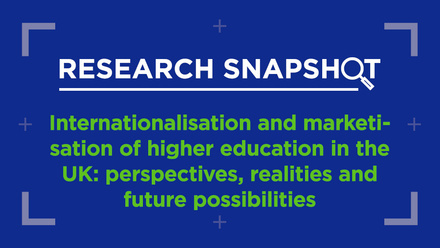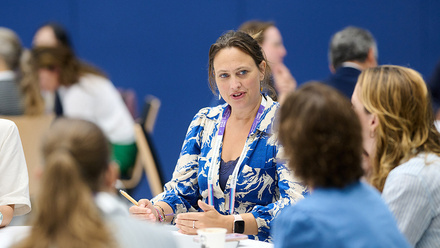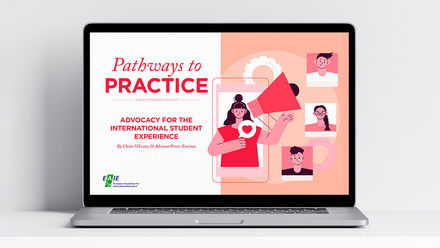Strategic hiring: identifying the ideal international officer

Building and maintaining effective work teams is the goal of any international office, but how can you identify the ideal candidate to join your team? To ensure organisational effectiveness, managers need to examine the relationship between the work to be accomplished and the people who deliver the work. To effectively recruit and retain international officers, and thus to achieve their goals, managers need to know which skills and knowledge to look for among applicants.
If you’re planning to hire new staff for your international office this year, you’ll want to seek out a specific set of skills. In your hunt for the perfect candidate, be sure to look for the following qualities.
Appreciation of other cultures
International officers must have first-hand experience of internationalisation. Simply having a passion for travel does not makes a great international officer. It requires having lived – and, ideally, having studied – abroad. These candidates have themselves experienced what students encounter when they go abroad.
Professionals who have lived abroad, and especially those who have studied overseas, bring value to the international office
Travelling to other countries for pleasure (especially on tours or to all-inclusive hotels) is not the same as having lived for several years in another country, which immerses a person in the vast richness that a culture has to offer. International officers should be equipped to cope with any cross-cultural situations that may arise (such as cultural misunderstandings, language barriers and international protocols).
Professionals who have lived abroad, and especially those who have studied overseas, bring value to the international office. They’re more likely to have the skills and knowledge to sensitise others to the social construction of active international citizenship; develop well-thought-out programmes that take into account issues that people without international experience might overlook; and promote tolerance, respect, mutual comprehension and solidarity among students, faculty and staff members from a range of backgrounds – especially in these times of growing xenophobia.
Strategic planning skills
International departments in universities and colleges around the world regularly receive requests from current and potential partners to pay them a visit, establish partnerships, develop programmes, or work on joint research projects. International officers need to be able to assess these external requests and prioritise them according to their objectives and their alignment with their home institution’s international strategy and strategic plans.
Furthermore, international officers require sound judgment to interpret those requests based on the policies and procedures of their institution, as well as the needs of the faculties and academic departments. International officers should have the strategic planning skills to classify international visits by priority and by their potential outcomes. For example, visits from institutions with similar strong academic programmes and research strengths are more suited to a joint programme project than are visits from universities whose academic areas are not aligned with the academic offerings of the officer’s home institution. The international officer must be able to foresee potential outcomes of each visit in order to develop a program for the visitors that meets the needs of both academic institutions.
Project management skills
Being able to successfully develop, manage and lead projects and programmes is crucial in any international department. International officers should possess the skills to plan and execute projects on time and budget. By using project management principles (initiation, planning, implementing and closing), international departments can build their success based on timely and efficient completion of projects. International officers apply these techniques when managing agreements and contracts, applying for grants, developing study abroad programmes and hosting events and conferences. A background in project management will enable international officers to prioritise and multitask when working on numerous projects and deadlines.
In colleges and universities, heads of international offices are under pressure to prove to their executive leaders that their programmes and strategies are effective. The presence of staff with project management skills will enable managers to provide reliable evidence of the effectiveness of their operations. International officers with strong project management skills can develop benchmarking and performance measurements to evaluate the effects of their programmes, as well as to reveal areas for improvement. Using this information and data, managers can generate strategies for the short and long term, as well as decide how to spend their budget in this era of worldwide financial constraint.
Connected with current trends and the youth
The field of international education is ever-changing, and international officers must remain connected with the world by pursuing continuing professional development opportunities and by keeping up to date with trends in education and the interests of youth.
Attending international education conferences not only gives education professionals an overview of what other institutions are doing, but also provides a space for international officers to connect with colleagues and expand their network. Furthermore, international officers need to pursue professional development by, for example, completing online certificates or week-long intensive programmes to enhance their skills. And once they finish a programme, they should share their new knowledge with their colleagues: giving a presentation not only shares learning among peers, it fosters rapport within a team.
Knowing what motivates young people is essential when developing student-related programming
Lastly, international officers should be in touch with youth: know what their interests are (regarding programme offerings, campus life, recreational services etc), what their constraints are (such as the cost of attendance and the challenges of obtaining a visa), and what is currently ‘hot’ (in pop culture). For example, we saw US colleges and universities taking advantage of the Pokémon Go mobile game craze to recruit students by posting social media pictures of Pokémon on their campuses. Then there was a wave of UK universities using their Snapchat accounts to showcase their campus life by allowing students to stream a day in the life of that institution. Most recently, some universities in Canada decided to reduce international PhD fees to the same level as those for domestic students, with the aim of attracting bright minds from around the world that might not be pursuing an education abroad due to financial constraints. Knowing what motivates young people is essential when developing student-related programming, such as study abroad opportunities and recruitment initiatives.
The interests and needs of today’s students, faculty and staff members are not the same as they were decades ago, or even five or ten years ago. International offices must adapt to these changes to be able to provide the right programming and support services to their university community. Hiring managers need to strategically choose the right people to join their team as international officers. More than ever, candidates must demonstrate that they appreciate the richness of diversity and inclusion; have strong strategic and project management skills; are up to date on trends on international higher education; and are connected with the current interests and concerns of youth.






